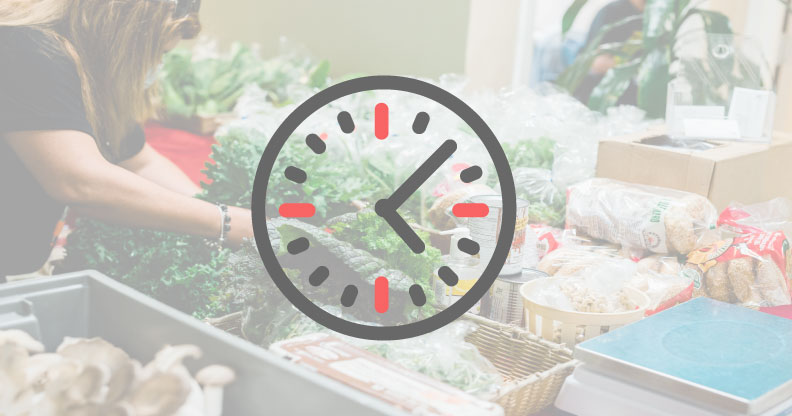Staff at Moisson Montréal, busily load their delivery trucks with food items. On the Island of Montreal, this Moisson makes regular deliveries to 288 community agencies, which fill 600,000 requests for food assistance each month.

Volunteers with the Bon matin service at the Centre Multi-Ressources de Lachine make their daily phone calls to dozens of isolated seniors to connect with them and lift their spirits. These calls are often the only human contact that these seniors get every day.

While moms go to Escale famille Le Triolet to chat with each other, their little ones learn new things at the drop-in daycare. This centre is a friendly and informal place where these mothers can connect and help each other. Since only French is spoken, this is an opportunity for many women to practise their new language.

The bell rings for lunch at the Calixa-Lavallée high school in Montréal-Nord. Students from Secondary 1 and the welcome classes meet up with peer helpers in a special room just for them. These helpers are older students who are trained on how to help younger students better integrate into school. Every day they eat lunch together, do their homework, play games, and talk about their problems under the supervision of a counsellor from Coup de Pouce jeunesse de Montréal-Nord.

Over 200 people meet daily at the MultiCaf community cafeteria in Côte-des-Neiges. For only $2 ($1 for children), they can eat a hot, nutritious meal while building lasting relationships with others in their community. The MultiCaf cafeteria is also a gateway to other services in the neighbourhood.

About 20 newcomers who are integrating and taking French classes go on a neighbourhood tour organized by the Comité de développement local de Chomedey (CDLC). The bus tour includes visits to local agencies and facilities (libraries, recreation centres, etc.) and meetings with agency staff. These visits are for people who may be isolated and vulnerable.

Arts and crafts workshops are held at La Maison de Jonathan for about a dozen teens who are no longer in school. Every young person is paired with an experienced adult, who provides them with a safe environment that helps them experience success. The youths can choose from multiple activities, such as sewing, carpentry, cooking, or music, on top of academic workshops that help them continue progressing in basic subjects like Math, French and English.

A worker at the Verdun Citizen’s Action Committee meets with a young couple struggling with a housing problem that is compromising their and their children’s health. They get answers to their many questions and find tools to take action. They will be helped throughout the process to solve their problem.

The collective cooking workshop ends at Centre de femmes du Haut-Richelieu. The six workshop participants not only help each other and share their cooking knowledge and skills, but they also save a great deal of time and money. They go home with many nutritious meals for their families for a whole week.

A worker from Je Réussis provides home tutoring to a struggling student. In addition to helping children with their homework and lessons, the tutor develops a relationship of trust with parents, whom she also helps develop new skills. She also becomes a resource person for the family. If other needs arise, she refers them to agencies in the neighbourhood.

Young adults who live at the Auberge du cœur l’Escalier come together for their weekly community dinner. Some are back from work—a new accomplishment in their lives—while others who have just left the street have had a more difficult day. No matter what stage they are at, they are in good hands to continue their journey in a warm, friendly and welcoming environment.

A father goes to CIVA (Centre d’intégration à la vie active pour les personnes vivant avec un handicap physique) to pick up his son, who takes part in a weekly Boccia match for children with disabilities. This adapted sport lets him socialize, make friends, participate in community life, and improve his health and quality of life.

Philippe, an outreach worker with TRIL (Travail de Rue Île de Laval), criss-crosses the streets and parks of the Pont-Viau neighbourhood in Laval. All young people in the area know him and know they that can count on him in good times and bad. His work basically consists of creating relationships of trust with youths and being available and involved in what goes on in the neighbourhood.

An Indigenous woman takes a break from the street at Résilience Montréal, a low-barrier drop-in centre that admits people who use substances. Here she can eat, have a shower, use the laundry room, and talk about her problems with a psychosocial counsellor.

A man in psychological distress confides in a worker from Suicide Action Montréal, who offers listening and support while assessing the signs of a possible a suicidal act. Every effort will be made to keep him safe and protect his life.

A young woman in difficulty is welcomed at Passages : ressources pour jeunes femmes en difficulté. She can stay overnight and even longer to start a social reintegration process. Welcome, listening, individual counselling and group activities will empower her to get her life on track.



















